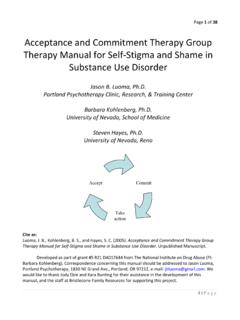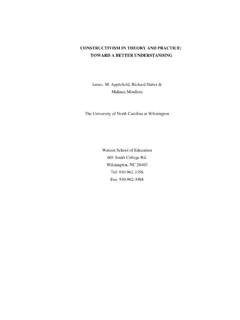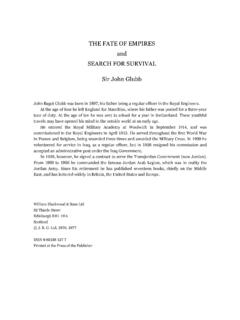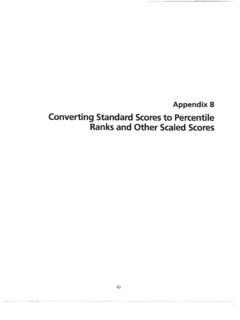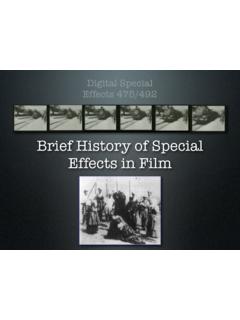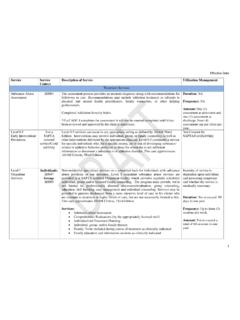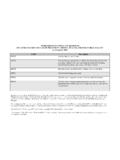Transcription of Motivational Groups for Community Substance …
1 Motivational Groups for Community Substance abuse Programs Karen S. Ingersoll, Christopher C. Wagner, and Sandra Gharib Mid-Atlantic Addiction Technology Transfer Center Unifying Science, Education and Services to Transform Lives Second Printing, 2002 Motivational Groups for Community Substance abuse Programs Karen S. Ingersoll, Christopher C. Wagner, and Sandra Gharib* Virginia Commonwealth University Mid-Atlantic Addiction Technology Transfer Center and *Richmond Behavioral Health Authority and Henrico Area Mental Health and Retardation Services Mid-Atlantic Addiction Technology Transfer Center Box 980469 Richmond, VA 23298-0469 (804) 828-9910 fax (804) 828-4377 Author email addresses: This publication was prepared by the Addiction Technology Transfer Centers (ATTC) under the cooperative agreement from the Center for Substance abuse Treatment (CSAT) of the Substance abuse Mental Health Services Administration (SAMHSA).
2 Susanne R. Rohrer, CSAT, served as the Government Project Officer. This volume is in the public domain and may be reproduced or copies without permission from CSAT or the individuals who compiled the information. However, the source materials and authors must be appropriately cited. The opinions expressed herein are the views of the authors and do not necessarily reflect the official position of CSAT or any other part of the Department of Health and Human Services (DHHS). Produced under a grant funded by the Center for Substance abuse Treatment, Substance abuse and Mental Health Services Administration, Department of Health and Human Services Center for Substance abuse Treatment. 5600 Fishers Lane Rockwall II, Suite 621 Rockville, MD 20857 301-443-5052 The contents are solely the responsibility of the authors and do not necessarily represent the official views of the agency.
3 Grant No. 1 UD 1TI13415 8 2000, 2002: Mid-Atlantic ATTC and the authors Contents Acknowledgments ..i Preface .. ii Overview of the Guide ..iv Part 1: Background and Motivation ..1 Motivational Elements of Models of Treatment and The Transtheoretical Model of Change ..6 Assumptions behind Motivational Making a Choice to Use A Motivational Approach ..20 Part 2: Practicing Motivational Counseling ..25 Motivational Principles ..25 Motivational Skills and Techniques ..26 FRAMES Skills and Techniques that Reduce Strategies ..44 Conceptualizing the Phases of Motivational Interventions ..44 Learning Motivational Motivational Services in Community Agencies ..46 Part 3: The Group Therapy Psycho-educational Groups .
4 51 Psychotherapeutic Groups ..52 Motivational Integrating Group and Individual Suggested Formats for Motivational Groups ..54 Designing a Motivational Group ..55 Providing Structure for the Group ..56 Model 1: Core Motivational Group ..60 Topic 1: Introduction to Group and Exploration of Topic 2: The Stages of Change ..66 Topic 3: Raising Awareness: The Good Things and Not-So-Good Things ..69 Topic 4: Looking Forward ..72 Topic 5: Decisional Balance: Pros and Cons of Changing and Staying the Same ..75 Topic 6: Exploring Values ..77 Topic 7: Supporting Self-Efficacy: Change Success Topic 8: Supporting Self-Efficacy: Exploring Strengths ..81 Topic 9: Planning for Change ..83 Topic 10: Exploring Importance, Confidence, and Desire for Change.
5 87 Model 2: Single Session Motivational Group ..91 Part 4: Implementing Motivational Services ..95 Technology Transfer Principles ..95 Comments on Implementation ..97 Assessing Agency Readiness ..99 Increasing Agency Working with Polarized Staff ..100 A Sample Model of Integrated Adding Motivational Services to your Continuum of Care: Some Lessons from the Substance abuse Treatment Field ..102 Special Populations ..105 Motivational Issues of Selected Special Populations ..107 Summary ..109 Part 5: References and References ..111 Some Recommended Readings ..116 Videotapes for Obtaining Training ..122 The SATOE Model ..123 SATOE Work The Mid-Atlantic ATTC and other ATTC resources.
6 127 iAcknowledgments We would like to acknowledge the contributions of the Virginia SATOE Work Group Members to our understanding of the pressing needs of public sector agencies for effective, usable treatment methods derived from clinical research. We thank all those involved with the SATOE process for their insights, field-based examples, and suggestions. This guide would not have been possible without the sponsorship of the Mid-Atlantic Addiction Technology Transfer Center, funded by SAMHSA/CSAT. A key contribution was the ATTC=s working relationships with Community practitioners, professional Groups , and educators, which provided us with the opportunity to integrate the accumulated wisdom of these individuals into this volume.
7 Our ATTC adopted Motivational Counseling as an area of emphasis, and supported training events as well as a website on Motivational Interviewing. We thank the staff of the following Virginia Community Services Boards, for their openness and sharing of ideas and experience: Harrisonburg-Rockingham CSB, Richmond Behavioral Health Authority, New River Valley CSB, Portsmouth CSB, District 19 CSB. We sincerely thank our excellent field reviewers, including: Stone, Scott Reiner, Deborah Van Horn, Dwight McCall, and Bob Skalleberg. While their guidance and expertise greatly improved the guide, its errors or flaws remain our responsibility. We thank Drs. Bill Miller and Steve Rollnick for their unparalleled and generous contributions to the field through their seminal work on developing and disseminating Motivational Interviewing.
8 We also thank David Rosengren and Craig Noonan for providing us samples of their work developing Motivational Groups . Portions of the approach to Motivational Interviewing described in this guide have been adapted from their work. Finally, we thank the members of the Motivational Interviewing Network of Trainers (MINT), who have added considerably to our understanding of MI practice and training issues. ii Preface This guide is a substantive revision of a manual we developed in 1997 entitled Motivational Enhancement Groups for the Virginia Substance abuse Treatment Outcome Evaluation (SATOE) Model: Theoretical Background and Clinical Guidelines. That manual was developed to provide a structure for delivering Motivational enhancement interventions in a group format in public sector Substance abuse treatment programs in Virginia.
9 It was also developed to be evaluated for its efficacy as one part of the Virginia Substance abuse Treatment Outcome Evaluation Model. At that time, the manual was the result of a unique collaboration between a university-based group, the Virginia (now Mid-Atlantic) Addiction Technology Transfer Center (VATTC) of Virginia Commonwealth University, and a working group from the public sector=s Substance abuse services system convened by the Commonwealth=s Department of Mental Health, Mental Retardation, and Substance abuse Services (DMHMRSAS). We had consulted with that group to help guide implementation of Motivational counseling services in public sector Community agencies across Virginia. We discovered that many of these programs did not have the resources to provide individual counseling services to their Substance abuse clients, not even in a brief format.
10 Thus, we agreed to develop a guide to help the programs Ameet somewhere in the middle@ between a Substance abuse education group format already offered at many of the settings, and the MI individual counseling approach with which we were familiar. Our goal was to help bridge the gap between research and treatment practice and to make practical information regarding Astate-of-the-art@ treatment available to counselors in the field. After DMHMRSAS disseminated the ASATOE Manual,@ as we called it, we continued to conduct training events and provide consultation on Motivational counseling. Through that work, we came to realize that our earlier manual could be usefully expanded to include discussion about implementing and integrating Motivational Groups in Community based agencies.
